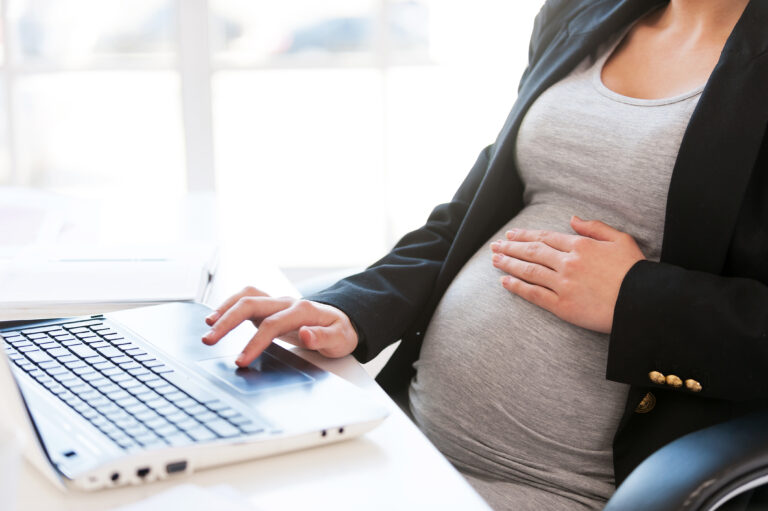
Tens of thousands of women a year suffer pregnancy discrimination but only a handful enforce their rights
Today, the Equality and Human Rights Commission has published findings from the largest ever survey of the scale of pregnancy discrimination in Britain’s workplaces. Its headline finding: one in nine new mothers is forced out of work each year because of their pregnancy or maternity leave.
That’s 54,000 women each year who are dismissed, made compulsorily redundant when no other colleagues are, or who are treated so poorly they feel forced to resign from their jobs. That’s 54,000 women a year left without an income, worrying about how they and their families are going to make ends meet and facing an uphill struggle to get back into work when they have a new baby to look after.
Frances O’Grady describes today’s survey as a “shocking report”. But it’s the personal stories behind the statistics that can really shock. For a flavour of these see the TUC’s Pregnancy Test report from December last year, this previous blog by my colleague Scarlet Harris or the testimonies of women posted on this recently established ‘Pregnant Then Screwed’ website. It is shocking too that women are still suffering such treatment on such a scale 40 years on from the introduction of the legal right to paid maternity leave, the right to return to the same job and the right not to suffer a dismissal linked to pregnancy.
I suspect, though, that many trade unionists and advice workers will not be surprised by today’s report, given what they have seen and heard over recent years. In 2009, the TUC and advice organisations like Maternity Action, Working Families and Citizen’s Advice came together to form the Alliance Against Pregnancy Discrimination because we were concerned that such discrimination was on the rise. The EHRC’s findings confirm our fears that despite all the high level commitments from politicians and business leaders to valuing women in the workplace, for new mothers things have been getting worse.
Ten years ago, in June 2005, the then Equal Opportunities Commission published the findings of its investigation into pregnancy discrimination. At that time, it found that 30,000 women a year – around one in 15 new mothers – were being forced out of work because of pregnancy. This was based on a smaller sample and was less reliable estimate than today’s figure but, given the rise in the number of tribunal claims for pregnancy-related detriment and dismissal that we also saw in the years following the 2008/9 recession (before tribunal fees were introduced), there should be no doubting the upward trend.
What is striking in light of today’s headline 54,000 figure is how few women take formal action to enforce their rights. In the past year, just 788 women have brought a claim of pregnancy-related detriment or dismissal to an employment tribunal. Perhaps not surprising though if you pause to consider what a new mother is dealing with: sleepless nights, a newborn baby demanding round-the-clock attention, a significantly reduced income and increased expense. No wonder so many women find it so hard to find the time or energy to research the law, seek advice and lodge a well drafted legal claim within 3 months of the discrimination they have suffered. No wonder that so few feel ready to stump up £1,200 to get a case lodged and heard at tribunal.
Today’s report shows that pregnancy discrimination affects all kinds of women. Young women and those in lower paid jobs experience the worst treatment during pregnancy but higher paid, professional women are more likely to experience difficulties upon return to work. But it also finds that it is the women with the least bargaining power in the workplace who are the least likely to challenge the poor treatment they experience. Overall, one in five mothers raised issues with their employer but the highest paid were the most likely to complain (35% of those earning £60,000 or more a year did so). The women who were agency workers, on zero hours contracts or employed on a casual basis were the least likely to say anything (just 12% complained).
We understand that the EHRC will be now be considering what needs to be done in light of its findings and will be making policy recommendations in the autumn. This report must be a wake-up call for employers and for all those supporting women in the workplace to consider to what more can be done to change practice and to improve compliance with the law.
Government ministers must also consider what they need to do to change things. Charging women £1,200 to take a pregnancy discrimination or dismissal case to tribunal, slashing funding for advice agencies and the EHRC (the statutory body with responsibility for ensuring compliance and enforcement of equality rights) and limiting the time that trade union reps have to deal with problems at work will do nothing but undermine good practice and compliance. It is time for them to stop their crusades against ‘red tape’ and organised labour and to consider the impact their policies are actually having on individual workers.
Sally Brett – Equality Policy Officer – TUC












